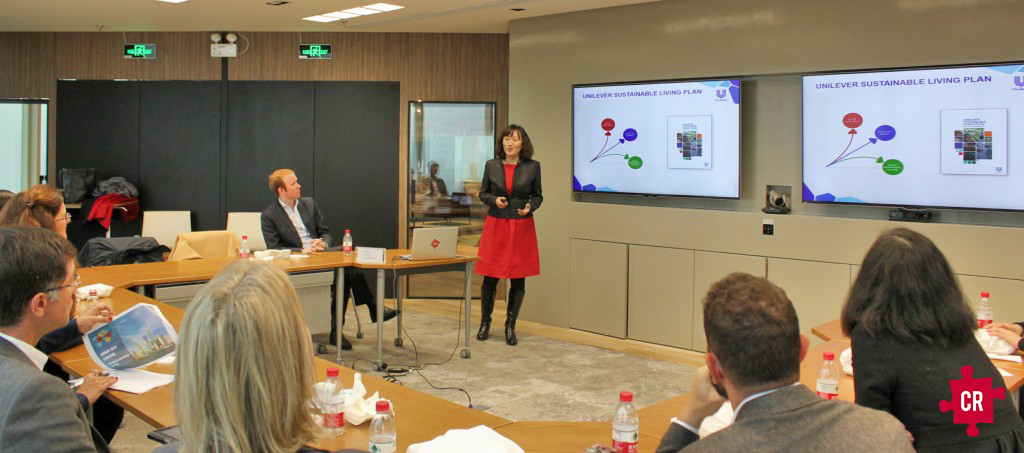
As sustainability is starting to move out of the confinements of a single department within a firm, building an ambassador network is the perfect way to begin the transition across departments and create alignment on your sustainable business strategy. Whether it be a passionate individual who aspires to create a more economically, socially and environmentally resilient world by engaging and inspiring others and wants a change agent in their organization, or a socially minded Intrapreneur who sees a new market for the organization, the identification, and empowerment of these ambassadors can be a powerful tool for a firm looking to position itself on a more sustainable path.
Which is why kicked off our 2016 Beyond Business as Usual Executive luncheon series on developing sustainability ambassadors and give participants an insider perspective on how to engage employees to help internally involve others and externally promote the sustainability work being done. To help us bring tangibility to the business, we invited Ashwin Subramaniam, Co-founder and Chief Purpose Officer at Gone Adventurin’ to speak at our Singapore session; Glenn Frommer, previously Head of Corporate Sustainability at MTR, for Hong Kong; and Marina Wu, Director of Communications and Sustainability at Unilever for our Shanghai session.
Ashwin stressed the importance of having support from the management team when sustainability ambassadors start their journeys, and that without the backing from his boss, he would never have achieved what he has now accomplished. His recent project to find sustainability ambassadors in Vietnam to help him with his social media campaign taught him that how critical it is to “package” sustainability issues in an engaging way – the impact of storytelling, and many corporate professionals fail to communicate the narrative while spending a lot of resources and energy on building projects.
Glenn spoke about how his ability to build internal alignments, speak the language of the business, and contribute to the success of projects , allowed him to overcome the initial reaction of his peers to the “environmental guy” to successfully drive sustainability initiatives internally. He shared his experience in gaining support from the Safety Manager and the importance of finding an internal ally, and talked about the need to build an effective system within firms so that when new sustainability ambassadors start they understand clearly what their responsibilities are from the first day.
Marina shared her insights on how Unilever has embedded sustainability into its business operations and successfully built an ambassador program in China with support from Collective Responsibility. Using a four-step behavior change framework, Marina shared Unilever’s effort in promoting sustainability awareness and engagement. She discussed their approach of using external channels, such as traditional media, and internal communication channels such as a quarterly magazine, quarterly town hall meetings and leadership forums to engage employees internally and deliver Unilever’s narrative externally. Marina also talked about the impact of Unilever’s Green Ambassador program on promoting better understanding of sustainability. Through intensive training and experiential learning, the trainee program has successfully cultivated batches of young ambassadors who understand Unilever’s commitment on sustainability and are able to lead others.
Through their presentations, and the ensuing discussions, we identified 6 keys to success of building a sustainability ambassador network:
- Start small – create a program for 3-5 employees with narrowly defined mission, scope, and timeline
- Start young and with people who can be (1) managed and (2) can grow into management roles
- Diversify by involving individuals from across business functions
- Provide support through executive champions as well as time / funding allocations
- Recognize the individuals and work being done regularly
- Allow it to grow organically and beyond your control
Success that is often slowed when:
- There is a gap between company vision/ definition for sustainability and personal vision/ definition
- Level of commitment, real or perceived, is deemed too great by employee and the opportunity is not compelling enough
- Uncertainty around the program goals, responsibility of ambassador, or potential output/ impacts
Each ambassador program will look different to reflect the particular values and goals of the firm, but the strategy to design, develop and maintain a successful program will have similar problems to overcome and the “keys to success” applicable to all.
If you wish to learn more about building your own Sustainability Ambassador Network please reach out to Charlie Mathews at [email protected] or Yuxin Wang at [email protected].
To join our next luncheon, or to learn more about the series, please click here.
